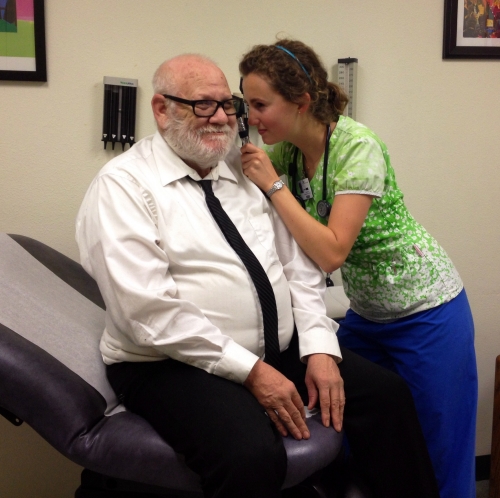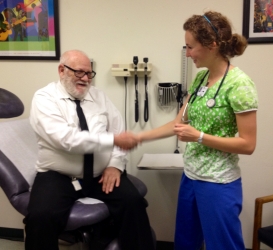Lessons from a year in service

Caroline Kemp '13 BSN examines a patient at the Saint Vincent de Paul Clinic in San Diego where she has been volunteering this first year as an RN.
As a new graduate of the College of Nursing, Caroline Kemp’s chosen path is anything but typical. While most new nurses launch their careers on various types of hospital units, Caroline made the decision to spend her first year after graduation volunteering for an Augustinian year of service.
With multiple sites across the United States, and one location in Peru, the Augustinian programs help underserved individuals in numerous ways. As a new registered nurse, Caroline works at the Saint Vincent de Paul Clinic in San Diego, California. The clinic, staffed with a full medical team, serves the local homeless population, either living at the Saint Vincent de Paul Village or on the streets. “We care for patients who are enduring every kind of illness under the sun,” notes Caroline, “I have learned so much, from wound care to what to do in an emergency. This experience has really shaped me as a nurse and as an individual.”
Caroline believes her undergraduate experience at Villanova helped to prepare her for her responsibilities at the clinic. She explains that the work she does every day embodies one of the most important tenets taught at Villanova’s College of Nursing. “As nurses, we must treat the whole person and their family members, not just the illness,” says Caroline. When asked what experience stands out the most, she states that every day provides her with a meaningful experience. Recently, she had the privilege of working with a man who was recovering from abdominal surgery, with a wound left open due to infection.

While it is not uncommon for nursing responsibilities to include wound care and medication teaching, Caroline delves deeper to treat the whole patient. The man returned to the clinic every-other-day for wound care. She explains, “He told me that he spent his life in and out of jail, mostly because of an addiction to heroin. He turned his life around because of his desire to be there for his granddaughter.” Caroline goes on to say, “I was so sad the day he came in and told me he decided to move into a sober living house outside of San Diego. He started to tear-up when he said goodbye to me. He said, ‘Mi hija, if only you knew how much of a difference you have made. You have turned an unfeeling gangster into someone who feels. You make me feel like a human.’ I just wish I could convey to him the difference he made in my life.”
After a full day’s work, Caroline returns home where she shares a living space with five other people. She explains that they share a very limited budget allocated for food, transportation, and activities. “Living on such a small budget is one of the biggest challenges of the experience,” says Caroline. “We all really have to work together to make things doable,” she says. When the year of service is complete, Caroline plans to return closer to home in the Northeast. She misses being close to family and friends. “I am not sure what specific area of nursing I would like to go into,” shares Caroline, “I definitely want to work in a hospital setting, and I enjoy triage and urgent care.” Whatever career path she takes, Caroline says she will utilize the experiential lessons she learned over the course of her year of service. “No matter where I go next year, or in the future, I will carry the lessons of this year and the memories of my patients with me always,” says Caroline.
